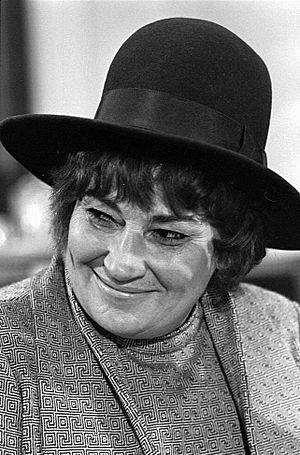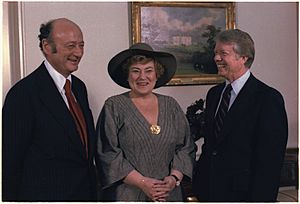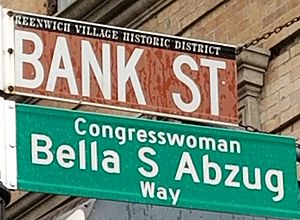Bella Abzug facts for kids
Quick facts for kids
Bella Abzug
|
|
|---|---|
 |
|
| Member of the U.S. House of Representatives from New York |
|
| In office January 3, 1971 – January 3, 1977 |
|
| Preceded by | Leonard Farbstein |
| Succeeded by | Ted Weiss |
| Constituency | 19th district (1971–1973) 20th district (1973–1977) |
| Personal details | |
| Born |
Bella Savitsky
July 24, 1920 New York City, New York, U.S. |
| Died | March 31, 1998 (aged 77) New York City, New York, U.S. |
| Political party | Democratic |
| Spouse |
Martin Abzug
(m. 1944; died 1986) |
| Children | 2 |
| Relatives | Arlene Stringer-Cuevas (cousin) Scott Stringer (cousin) Liz Abzug (daughter) |
| Education | Hunter College (BA) Columbia University (LLB) Jewish Theological Seminary |
Bella Savitzky Abzug (born July 24, 1920 – died March 31, 1998) was an American lawyer and politician. People often called her "Battling Bella" because she fought hard for what she believed in. She was a major leader in the women's movement.
In 1971, Bella Abzug helped start the National Women's Political Caucus. This group worked to get more women involved in politics. She was also a key figure in eco-feminism, which connects women's rights with environmental protection. In 1970, her campaign slogan was, "This woman's place is in the House—the House of Representatives." She later led important commissions for women's rights under Presidents Gerald Ford and Jimmy Carter.
Contents
Early Life and Education
Bella Savitzky was born in New York City on July 24, 1920. Her parents were Jewish immigrants from Russia. Her mother, Esther, was a homemaker. Her father, Emanuel, owned a meat market. Even as a child, Bella was very competitive. She often helped her father at his deli.
Her religious background helped shape her views on women's rights. Bella noticed that women had to sit in the back rows of the synagogue. She felt this was unfair. When her father died, Bella was 13. Her synagogue did not allow women to say the Kaddish, a special prayer for mourning. But because her father had no sons, Bella went to the synagogue every morning for a year to say the prayer. She bravely went against tradition to honor her father.
Bella graduated from Walton High School in The Bronx. She was the class president. She studied political science at Hunter College. She also attended the Jewish Theological Seminary of America. At Hunter College, she was student council president. She later earned a law degree from Columbia University in 1944.
Bella Abzug's Legal and Political Career
Bella Abzug became a lawyer in New York in 1945. At that time, very few women were lawyers. She worked on cases involving workers' rights, tenants' rights, and civil liberties. She even took on civil rights cases in the Southern United States.
She strongly supported liberal causes. These included the Equal Rights Amendment for women. She also spoke out against the Vietnam War and the military draft. She worked for groups like the American Civil Liberties Union. Bella was brave enough to challenge powerful committees during the McCarthy era. Her strong views even put her on a list of political opponents for President Nixon.
Bella Abzug in Congress
Becoming a Congresswoman
In 1970, Bella, known as "Battling Bella," ran for Congress. She challenged the current representative, Leonard Farbstein. She won the Democratic primary election, which was a big surprise. Then she won the main election against Barry Farber.
In 1972, her district changed. She ran against William Fitts Ryan. Ryan won, but he sadly passed away before the election. Bella then won the party's vote to become the new Democratic candidate. She was easily reelected in 1974. For her last two terms, she also represented parts of The Bronx.
Key Achievements in Congress
Bella Abzug was one of the first members of Congress to support gay rights. She introduced the first federal bill for gay rights in 1974. She also led important hearings about government secrecy. Her colleagues in Congress voted her the third most influential member of the House.
She sponsored the Equality Credit Opportunity Act. This law made it illegal to treat people unfairly when they applied for credit. It protected people based on their race, religion, sex, and age.
Bella was famous for her colorful hats. She was rarely seen without one. Even though hats were not allowed on the House floor, she often wore them. She once said she felt "naked and unrecognizable" without her hat. She famously reminded people, "It's what's under the hat that counts!"
In 1975, Bella Abzug went to Saigon, Vietnam. She was part of a group sent by President Gerald Ford. Their job was to see what was happening near the end of the Vietnam War.
Bella Abzug supported Zionism, which is the movement for a Jewish homeland. In 1975, she spoke out against a United Nations resolution. This resolution said that Zionism was a form of racism. Bella said, "Zionism is a liberation movement."
Campaign for U.S. Senate
Bella Abzug's time in Congress ended when she ran for the U.S. Senate in 1976. She lost the Democratic nomination by a very small amount. She lost to Daniel Patrick Moynihan. Moynihan went on to serve four terms as a senator.
Later Life and Legacy
After leaving Congress, Bella Abzug never held elected office again. But she remained a very well-known public figure. She ran for mayor of New York City in 1977 but was not successful. She also tried to return to the U.S. House in 1978 and 1986.
She wrote two books: Bella: Ms. Abzug Goes to Washington and The Gender Gap. The second book was co-written with her friend Mim Kelber.
In 1977, President Jimmy Carter asked Bella Abzug to lead a new commission. This group worked to observe International Women's Year. They held many events, including the 1977 National Women's Conference. Bella continued this work until she was dismissed in 1979. This caused some tension between the Carter administration and feminist groups.
Bella Abzug started several groups that supported women. She founded Women USA, a grassroots organization. She continued to lead events for women's rights. For example, she was the grand marshal of the Women's Equality Day march in New York in 1980.
In the 1990s, Bella co-founded the Women's Environment and Development Organization (WEDO) with Mim Kelber. This group works for human rights, gender equality, and a healthy environment around the world. In 1991, WEDO held a big conference in Miami. There, 1,500 women from 83 countries created the Women's Action Agenda 21.
At the United Nations, Bella helped create the Women's Caucus. This group worked to make sure women's issues were included in global discussions. She lobbied for women's rights at major UN conferences.
Even in her last years, Bella kept a busy schedule. She traveled and worked, even using a wheelchair. She led WEDO until she passed away. Her last public speech was at the UN in March 1998.
Bella Abzug died on March 31, 1998, at age 77. She had been battling breast cancer and developed heart disease. She passed away from complications after heart surgery. She is buried in Old Mount Carmel Cemetery in Glendale, New York.
Personal Life
In 1944, Bella married Martin Abzug. He was a novelist and stockbroker. They met on a bus in Miami, Florida. They were married until Martin's death in 1986. They had two daughters. Bella was also a cousin to Arlene Stringer-Cuevas and Scott Stringer, who were also involved in New York City politics.
Honors and Recognition
Bella Abzug received many honors for her work.
- In 1991, she received the "Maggie" Award.
- In 1994, she was added to the National Women's Hall of Fame. She also received a medal from the Veteran Feminists of America.
- In 1997, she was honored at the United Nations. She received the Blue Beret Peacekeepers Award, the highest civilian honor at the U.N.
In 2004, Bella's daughter, Liz Abzug, started the Bella Abzug Leadership Institute (BALI). This institute helps high school and college women become leaders. In 2007, BALI hosted a National Women's Conference. This celebrated the 1977 conference that Bella Abzug had led.
In 2017, Time magazine named Bella Abzug one of its "50 Women Who Made American Political History." Several places in New York City are named after her. In 2019, Hudson Yards Park was renamed Bella Abzug Park. A part of Bank Street in Greenwich Village is also named for her.
See also
 In Spanish: Bella Abzug para niños
In Spanish: Bella Abzug para niños
- Women's Equality Day
- List of Jewish feminists
- List of Jewish members of the United States Congress
- Women in the United States House of Representatives
 | Aaron Henry |
 | T. R. M. Howard |
 | Jesse Jackson |




